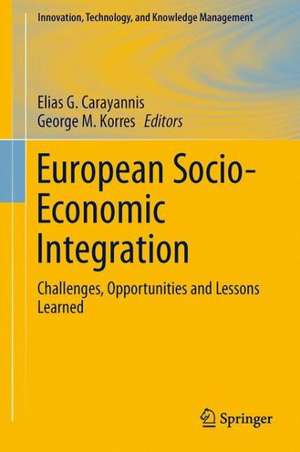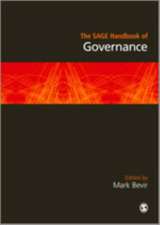European Socio-Economic Integration: Challenges, Opportunities and Lessons Learned: Innovation, Technology, and Knowledge Management, cartea 28
Editat de Elias G. Carayannis, George M. Korresen Limba Engleză Hardback – 6 dec 2012
- What are the main determinants and implications for socio-economic integration?
- How can economic policy influence the growth and integration process?
- Why is innovation important for regional economic development?
- What has been the policy response so far and what lessons have we learned from it?
- And finally, what are our action lines for the future?
| Toate formatele și edițiile | Preț | Express |
|---|---|---|
| Paperback (1) | 637.78 lei 6-8 săpt. | |
| Springer Us – 28 ian 2015 | 637.78 lei 6-8 săpt. | |
| Hardback (1) | 642.68 lei 6-8 săpt. | |
| Springer Us – 6 dec 2012 | 642.68 lei 6-8 săpt. |
Din seria Innovation, Technology, and Knowledge Management
- 15%
 Preț: 643.99 lei
Preț: 643.99 lei -
 Preț: 281.97 lei
Preț: 281.97 lei - 18%
 Preț: 954.62 lei
Preț: 954.62 lei - 15%
 Preț: 653.14 lei
Preț: 653.14 lei - 18%
 Preț: 945.62 lei
Preț: 945.62 lei - 18%
 Preț: 890.54 lei
Preț: 890.54 lei - 15%
 Preț: 640.06 lei
Preț: 640.06 lei -
 Preț: 383.93 lei
Preț: 383.93 lei - 15%
 Preț: 633.02 lei
Preț: 633.02 lei - 18%
 Preț: 1124.60 lei
Preț: 1124.60 lei - 18%
 Preț: 956.81 lei
Preț: 956.81 lei -
 Preț: 389.49 lei
Preț: 389.49 lei - 15%
 Preț: 655.13 lei
Preț: 655.13 lei - 20%
 Preț: 570.97 lei
Preț: 570.97 lei - 15%
 Preț: 642.03 lei
Preț: 642.03 lei - 18%
 Preț: 941.50 lei
Preț: 941.50 lei - 15%
 Preț: 643.00 lei
Preț: 643.00 lei - 18%
 Preț: 732.52 lei
Preț: 732.52 lei - 15%
 Preț: 637.59 lei
Preț: 637.59 lei - 18%
 Preț: 890.06 lei
Preț: 890.06 lei - 15%
 Preț: 635.47 lei
Preț: 635.47 lei - 15%
 Preț: 638.57 lei
Preț: 638.57 lei -
 Preț: 391.99 lei
Preț: 391.99 lei -
 Preț: 391.99 lei
Preț: 391.99 lei - 15%
 Preț: 632.22 lei
Preț: 632.22 lei - 20%
 Preț: 584.72 lei
Preț: 584.72 lei - 15%
 Preț: 642.18 lei
Preț: 642.18 lei - 18%
 Preț: 894.16 lei
Preț: 894.16 lei - 18%
 Preț: 943.73 lei
Preț: 943.73 lei - 15%
 Preț: 644.49 lei
Preț: 644.49 lei - 18%
 Preț: 947.85 lei
Preț: 947.85 lei - 15%
 Preț: 656.89 lei
Preț: 656.89 lei - 18%
 Preț: 954.45 lei
Preț: 954.45 lei - 18%
 Preț: 1006.72 lei
Preț: 1006.72 lei - 18%
 Preț: 727.31 lei
Preț: 727.31 lei - 15%
 Preț: 642.51 lei
Preț: 642.51 lei - 18%
 Preț: 953.65 lei
Preț: 953.65 lei - 15%
 Preț: 639.59 lei
Preț: 639.59 lei - 15%
 Preț: 645.47 lei
Preț: 645.47 lei - 18%
 Preț: 952.26 lei
Preț: 952.26 lei - 15%
 Preț: 639.08 lei
Preț: 639.08 lei
Preț: 642.68 lei
Preț vechi: 756.09 lei
-15% Nou
Puncte Express: 964
Preț estimativ în valută:
122.97€ • 128.40$ • 101.78£
122.97€ • 128.40$ • 101.78£
Carte tipărită la comandă
Livrare economică 04-18 aprilie
Preluare comenzi: 021 569.72.76
Specificații
ISBN-13: 9781461452539
ISBN-10: 1461452538
Pagini: 244
Ilustrații: XVI, 228 p.
Dimensiuni: 155 x 235 x 19 mm
Greutate: 0.48 kg
Ediția:2013
Editura: Springer Us
Colecția Springer
Seria Innovation, Technology, and Knowledge Management
Locul publicării:New York, NY, United States
ISBN-10: 1461452538
Pagini: 244
Ilustrații: XVI, 228 p.
Dimensiuni: 155 x 235 x 19 mm
Greutate: 0.48 kg
Ediția:2013
Editura: Springer Us
Colecția Springer
Seria Innovation, Technology, and Knowledge Management
Locul publicării:New York, NY, United States
Public țintă
ResearchCuprins
Inflation Convergence in Europe.- Economic Integration and Convergence in the European Union.- The Mathematical Capital and its Economic Value.- Political Decision in a Game Theory Approach.- Economic Integration and Small States: Non-Traditional Benefits.- The Greek Crisis & Co.D.TRA (Code of Digital Transactions): Mobile Payments and the Global Info-Cash (GIC).- Building Bridges in South Asia: Regional Cooperation Information Technologies and Opportunities for Integration.- Education Policy and Regional Convergence in European Union.- Innovation Process in the European Union: The Case of Galileo Project.- A Benchmarking Study for Human Capital in Europe.- Social Policy and Socio-Economic Integration in Europe.- Conversations with Civil Servants: East European Public Administration Reform in Search of Socio-Economic Development.- A New Methodological Approach of Job Requirement Assessment.- Critical Evaluation of the Greek Tourism Policy.
Textul de pe ultima copertă
Economic integration is one of the most noteworthy issues in international economic policy at the end of the twentieth century. The recent examples of the European Union (EU) and the North American Free Trade Association (NAFTA) have raised important questions about the economic integration process and the possible establishment of economic unions in other parts of the world. Against the backdrop of the financial crisis in Europe and prospects of increasing integration in Asia, this volume showcases research from an international array of researchers to provide a basic understanding of the current issues, problems, challenges, and opportunities for achieving integration, addressing both empirical and theoretical aspects of such topics as monetary union, social policy reform and social union, public finance and technology policy. The chapters in Part 1 are focused primarily on economic issues, while Part 2 covers on social policy, the welfare state, and political reforms, with a particular emphasis on the European Union. Among the questions addressed:
- What are the main determinants and implications for socio-economic integration?
- How can economic policy influence the growth and integration process?
- Why is innovation important for regional economic development?
- What has been the policy response so far and what lessons have we learned from it?
- And finally, what are our action lines for the future?
Caracteristici
Covers such timely topics as education policy, economic growth, and globalization in the context of integration Applies a variety of theoretical and analytical approaches Considers challenges and prospects for integration throughout Europe and in other regions, including Asia ?












